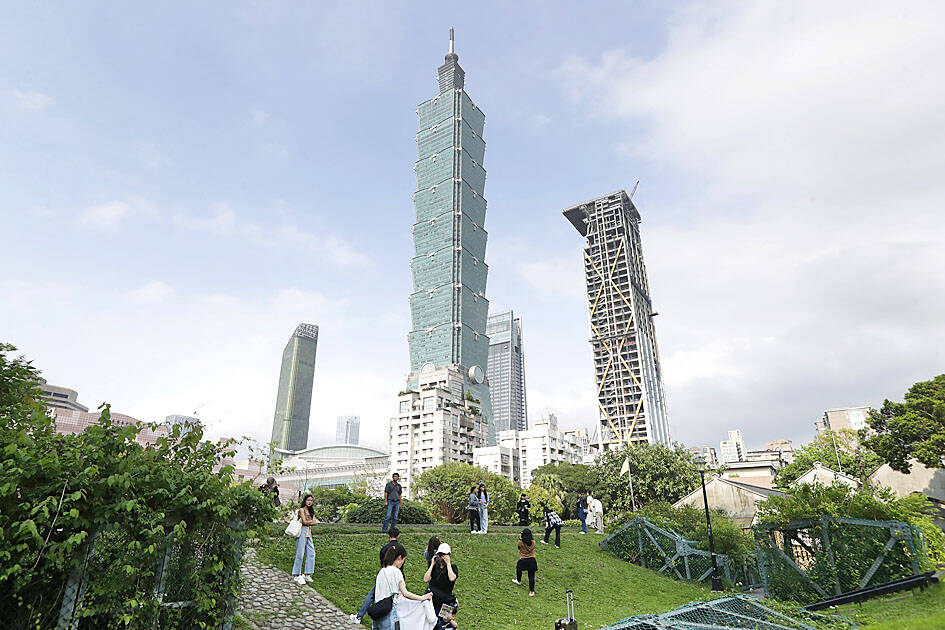The latest review on state-run banks’ exposure to US Treasuries and their internal risk management measures found no major issues, a Ministry of Finance official said yesterday.
The ministry last month asked nine state-run banks to report their exposure to US government bonds, risk management mechanisms and protocols, in response to public concerns over US assets.
So far, there were no major issues with the Treasuries exposures of the banks that would require authorities to take further measures, a ministry official, who spoke on condition of anonymity, said by telephone.

Photo: Chiang Ying-ying, AP
The ministry has not conducted any additional reviews since last month and has no plans for more reviews or for there to be regular checkups, the official said.
The comments came in response to a report by the Chinese-language Commercial Times yesterday, which said the ministry had asked state-run banks to adjust US bond portfolio allocations and lower their exposures if market concerns intensify.
Markets have been whipsawed by growing uncertainty over economic prospects after US President Donald Trump unveiled steep trade tariffs last month. The New Taiwan dollar has surged against the greenback in the past month, raising concern over the exposure to US dollar assets.
The state-run banks collectively hold about NT$340 billion (US$11.26 billion) in US government bonds, the Commercial Times said.
Chang Hwa Commercial Bank Ltd (彰化商業銀行), Hua Nan Commercial Bank Ltd (華南商業銀行), Mega International Commercial Bank Co (兆豐國際商業銀行) and Land Bank of Taiwan Co (臺灣土地銀行) are among the institutions holding the highest proportion.
In the middle of last month, a legislator voiced concern about local exposure to US Treasuries amid growing tariff and market uncertainty. In a statement late last month, the Ministry of Finance said state-run banks should adjust holdings to control risks if market concerns intensify, after it had completed a round of reviews.
The authority has asked the banks to actively manage and adjust their US government bond exposure following their internal protocols and mechanisms, the official said, adding that it would continue to closely monitor the situation and make adjustments accordingly.

Taiwan’s long-term economic competitiveness will hinge not only on national champions like Taiwan Semiconductor Manufacturing Co. (TSMC, 台積電) but also on the widespread adoption of artificial intelligence (AI) and other emerging technologies, a US-based scholar has said. At a lecture in Taipei on Tuesday, Jeffrey Ding, assistant professor of political science at the George Washington University and author of "Technology and the Rise of Great Powers," argued that historical experience shows that general-purpose technologies (GPTs) — such as electricity, computers and now AI — shape long-term economic advantages through their diffusion across the broader economy. "What really matters is not who pioneers

In a high-security Shenzhen laboratory, Chinese scientists have built what Washington has spent years trying to prevent: a prototype of a machine capable of producing the cutting-edge semiconductor chips that power artificial intelligence (AI), smartphones and weapons central to Western military dominance, Reuters has learned. Completed early this year and undergoing testing, the prototype fills nearly an entire factory floor. It was built by a team of former engineers from Dutch semiconductor giant ASML who reverse-engineered the company’s extreme ultraviolet lithography (EUV) machines, according to two people with knowledge of the project. EUV machines sit at the heart of a technological Cold

Taiwan Semiconductor Manufacturing Co (TSMC, 台積電) last week recorded an increase in the number of shareholders to the highest in almost eight months, despite its share price falling 3.38 percent from the previous week, Taiwan Stock Exchange data released on Saturday showed. As of Friday, TSMC had 1.88 million shareholders, the most since the week of April 25 and an increase of 31,870 from the previous week, the data showed. The number of shareholders jumped despite a drop of NT$50 (US$1.59), or 3.38 percent, in TSMC’s share price from a week earlier to NT$1,430, as investors took profits from their earlier gains

TAIWAN VALUE CHAIN: Foxtron is to fully own Luxgen following the transaction and it plans to launch a new electric model, the Foxtron Bria, in Taiwan next year Yulon Motor Co (裕隆汽車) yesterday said that its board of directors approved the disposal of its electric vehicle (EV) unit, Luxgen Motor Co (納智捷汽車), to Foxtron Vehicle Technologies Co (鴻華先進) for NT$787.6 million (US$24.98 million). Foxtron, a half-half joint venture between Yulon affiliate Hua-Chuang Automobile Information Technical Center Co (華創車電) and Hon Hai Precision Industry Co (鴻海精密), expects to wrap up the deal in the first quarter of next year. Foxtron would fully own Luxgen following the transaction, including five car distributing companies, outlets and all employees. The deal is subject to the approval of the Fair Trade Commission, Foxtron said. “Foxtron will be